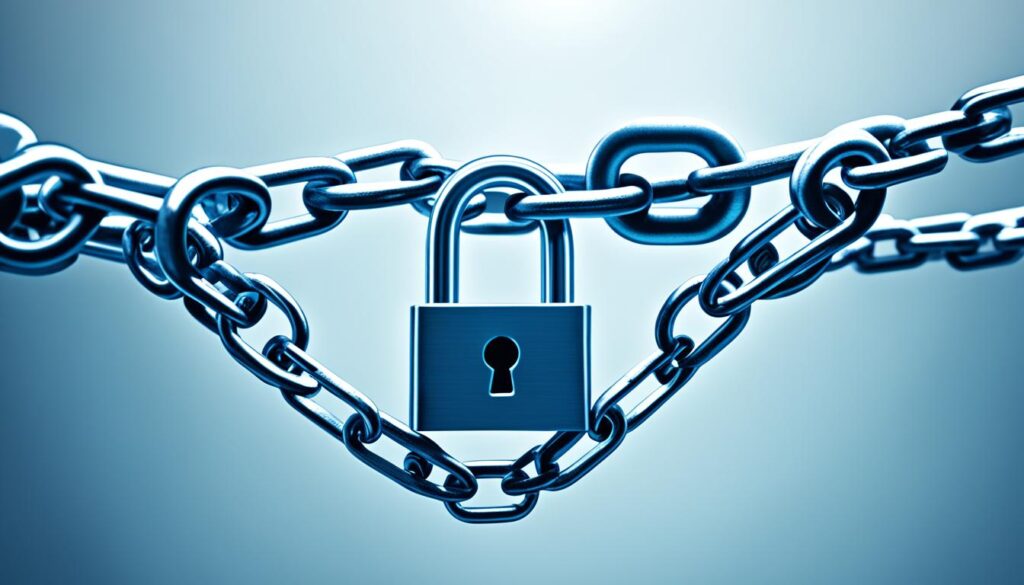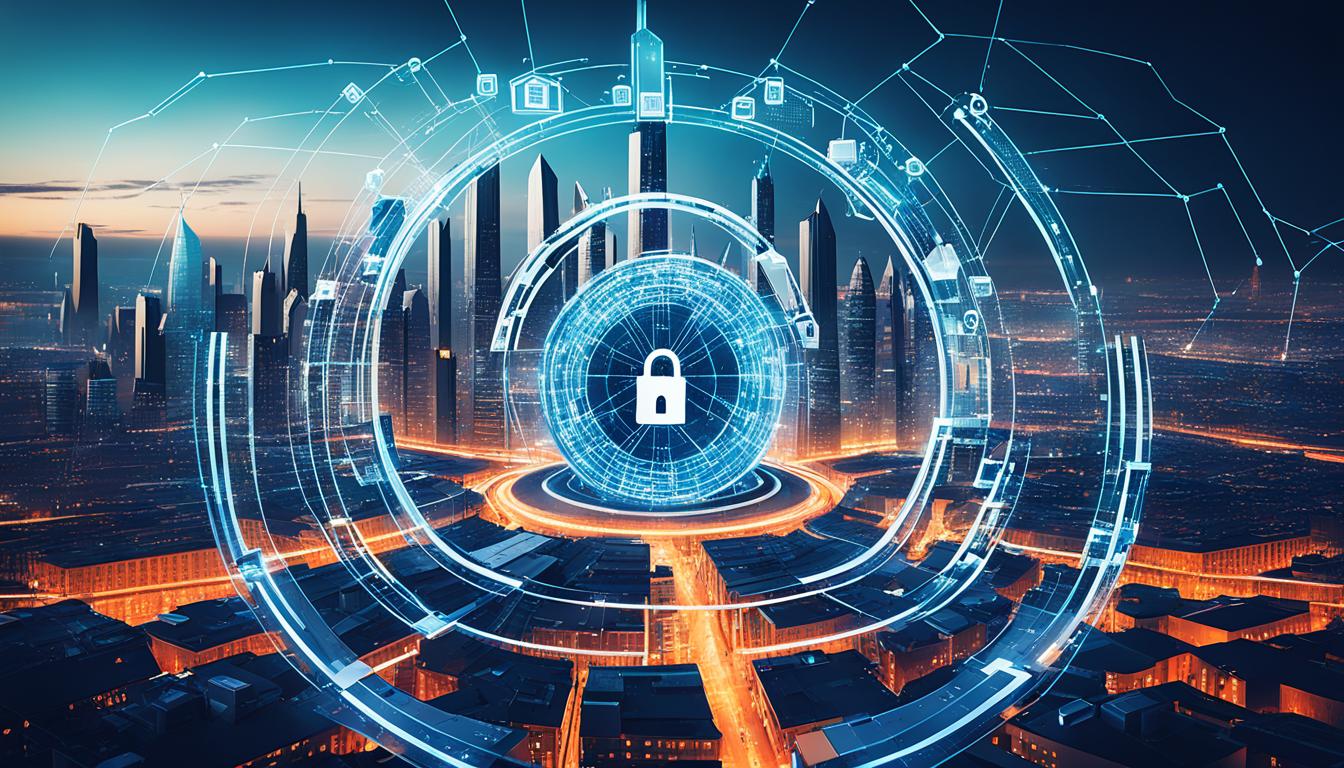Every minute, cyber attackers launch 2,244 attacks, a stark reminder of the ever-present threat in our digital world. Yet, amid this constant barrage lies a beacon of hope: blockchain technology. Known for powering cryptocurrencies like Bitcoin, blockchain is now a pivotal force in the cybersecurity domain, providing robust protection for online activities.
Imagine a world where your digital transactions are not just secure but virtually impenetrable. That’s the promise of blockchain cybersecurity impact, a breakthrough in securing decentralized networks. The benefits of securing blockchain extend far beyond cryptocurrencies, offering a competent shield against cyber attacks and bolstering data security. This revolutionary technology heralds a new era of secure transactions, ensuring that blockchain data protection isn’t a mere afterthought but a cornerstone of digital interaction.
As you navigate this cyber battlefield, blockchain technology is your ally, warding off threats and providing a transparent, enforceable, and secure digital framework. So strap in, because you’re about to delve deep into how blockchain is reshaping the cybersecurity landscape, making every byte of data you own safer with each block added to the chain.
Key Takeaways
- Blockchain technology is a formidable force against the high rates of cyber attacks, enhancing the security of digital ecosystems.
- Securing decentralized networks is essential, and blockchain facilitates a resilient infrastructure that’s tough on unauthorized access.
- Secure transactions and blockchain data protection are critical in preventing financial fraud and cyber espionage.
- Understanding how blockchain cybersecurity impact unfolds is vital for cultivating a safer digital future.
- The advances in blockchain spell out stronger data security protocols and mechanisms that stand firm against cyber threats.
- Adopting blockchain means gaining access to a suite of intrinsic benefits focused on safeguarding data integrity and privacy.
Understanding Blockchain Technology and Cybersecurity
As we delve into the intersection of blockchain technology and cybersecurity, it’s clear that blockchain is not just a buzzword but a pivotal force in the digital transformation. This emerging technology promises to redefine how a decentralized network operates, making robust cybersecurity measures more vital than ever.
Decentralized Systems and Digital Transformation
The rise of decentralized systems has opened a new chapter in the digital era. Unlike traditional centralized models, a decentralized network distributes control across numerous nodes, making it less susceptible to systemic failures or attacks. This is a core aspect of blockchain security, providing a transparent, immutable ledger where transactions are publicly verifiable but securely recorded.
Cryptographic Protocols Ensuring Secure Transactions
Cryptographic protocols serve as the bedrock for secure transactions within the blockchain. Through complex algorithms and blockchain encryption, these protocols ensure that each transaction is authenticated and irreversible, significantly reducing the potential for fraud and hacking. Let’s look at how these measures stand a step ahead in cyber threats prevention.
| Cybersecurity Feature | Role in Blockchain | Impact on Security |
|---|---|---|
| Advanced Encryption | Secures Data Transfer | Prevents unauthorized access |
| Public Key Infrastructure | Verifies User Identities | Establishes trust in transactions |
| Decentralized Consensus | Validates Transactions | Eliminates single points of failure |
| Smart Contract Protocols | Automates Agreements | Reduces human error and fraud |
The Evolution of Cyber Threats in a Blockchain World
In the ever-evolving landscape of cyber threats, blockchain technology continues to adapt and strengthen its defenses. From its inception, it has been about keeping one step ahead of malicious activities, fortifying the digital space against complex cyber attacks. It’s this adaptive nature that makes blockchain a cornerstone in contemporary cybersecurity strategies.
Every leap in technology brings new challenges, and the story is no different for blockchain. However, equipped with innovative cybersecurity measures and a foundation of cryptography, blockchain has the potential to profoundly secure our digital future. As we continue to witness this transformation, understanding the interplay between blockchain and cybersecurity will be paramount for any organization navigating the digital landscape.
The Marketer’s Guide to Blockchain Basics: Enhancing Your Marketing Strategy
Blockchain Cybersecurity Impact: A Symbiotic Relationship

The importance of blockchain cybersecurity cannot be overstated. As blockchain technology continues to pave avenues for innovation across industries, its intersection with cybersecurity has become more critical than ever. Intrinsically, both blockchain and cybersecurity efforts aim to ensure the integrity and reliability of data transactions. This synergy fosters a digital ecosystem where trust is paramount, especially in an age where data breaches and cyberattacks are commonplace.
Your understanding of the impact of cybersecurity on blockchain technology is crucial. While blockchain inherently offers a higher degree of security due to its decentralized nature and cryptographic fundamentals, it is not impermeable. Cybersecurity measures must evolve alongside blockchain advancements to protect against sophisticated threats that could exploit potential vulnerabilities in the blockchain framework.
Blockchain is the backbone of modern cybersecurity policies, enabling secure data transactions that are transparent yet impervious to fraud and unauthorized activities.
- Blockchain in Cybersecurity: Utilizing blockchain to generate immutable and transparent records for monitoring and auditing digital security measures.
- Importance in Cybersecurity: Developing cutting-edge security solutions that leverage blockchain’s distributed ledger to decentralize and thereby enhance cybersecurity infrastructure.
The table below illustrates how the growth of blockchain technology has perpetuated the importance of blockchain in cybersecurity, highlighting the reciprocal enhancements each brings to the other. From bolstering identity verification to securing supply chains, the cohesive bond between blockchain and cybersecurity is foundational for the future of digital protection.
| Cybersecurity Need | Blockchain Solution | Outcome |
|---|---|---|
| Secure Identity Verification | Decentralized Identity Management | Reduced Identity Theft |
| Fraud Prevention | Immutable Transaction Records | Trustworthy Audit Trails |
| Data Integrity | Chronological Data Chains | Tamper-Proof Data Logs |
| Supply Chain Transparency | Real-time Tracking via Smart Contracts | Enhanced Accountability |
With the right cybersecurity policies complementing blockchain frameworks, this technology becomes not just a ledger or a means for financial transactions, but a bastion for securing the digital realm. Aligning cybersecurity efforts with blockchain’s capabilities transforms the landscape into one that isn’t easily breached—subsequently upholding the sanctity of digital assets and personal identities.
Unpacking Blockchain Security Threats
In today’s era of booming blockchain technology, the security challenges it faces can’t be overlooked. It’s critical to peel back the layers of both apparent and underlying cybersecurity risks that threaten this emergent tech. As we delve into the blockchain vulnerabilities and the cyber threats that target these decentralized networks, it’s essential to understand that vigilance in implementing robust blockchain security measures and risk management practices is not just recommended—it’s imperative for the continued trust and operation of blockchain systems.
Cybersecurity Risks in Blockchain Technology
When you think of blockchain, the features marketed most often are immutability and enhanced security. However, like any technology, blockchain is not immune to cybersecurity threats. The decentralized nature of blockchain does mitigate certain risks, but it also introduces unique blockchain security threats that require specific attention. From 51% attacks, which can enable bad actors to take control of a network, to smart contract vulnerabilities, these risks highlight the need for comprehensive blockchain risk management strategies that can adapt to the evolving landscape of cyber threats to blockchain.

Blockchain Vulnerability Analysis and Cyber Attacks
Deep-dive vulnerability analysis of blockchain systems can expose weak points ripe for exploitation. Security professionals tirelessly work to identify and patch these weaknesses but face an ongoing battle against hackers who evolve their tactics. Phishing attempts, DDoS attacks, and private key theft are just a snippet of the cyber threats to blockchain. Their impact ranges from financial losses to shattered customer trust—a currency as valuable as any crypto asset on the ledger.
Securing Decentralized Networks Against Emerging Threats
As operators and users of blockchain networks, addressing cybersecurity threats in blockchain must be at the forefront of all operations. The development and deployment of blockchain security measures should be as dynamic and evolutionary as the technology they protect. Think of each blockchain security measure as a digital armor crafted to not just defend against known attacks but also to adapt to threats on the horizon, ensuring a resilient digital fortress.
| Threat Type | Impact on Blockchain | Security Countermeasures |
|---|---|---|
| 51% Attacks | Potential to reverse transactions and double-spend | Enhanced consensus mechanisms and network monitoring |
| Smart Contract Vulnerabilities | Can result in unauthorized access and loss of assets | Regular audits and bug bounty programs |
| Private Key Theft | Access to wallet and theft of cryptocurrency | Multi-factor authentication and cold wallet storage |
| Phishing Attacks | Deception to gain sensitive information | Education campaigns and advanced phishing detection systems |
| DDoS Attacks | Network disruption leading to loss of service | Redundant network architecture and anti-DDoS solutions |
By recognizing and understanding the potential cybersecurity threats in blockchain and adopting a proactive cybersecurity posture, we place ourselves in the best position to use blockchain technology not only with confidence but with the assurance that our digital assets and transactions are secure. The journey to achieving a fortified blockchain environment is ongoing, but with the right blockchain security measures and a solid risk management plan, we can navigate this digital terrain with far less concern for the cyber threats lurking in the shadows.
Cryptography’s Role in Enhancing Blockchain Security
At the heart of blockchain’s robust defense against cyber threats lies the sophisticated use of cryptographic techniques. These techniques not only secure the data but also ensure the validity of transactions across the network. As you explore blockchain encryption techniques, you’ll discover that the role of cryptography in blockchain security is not just a feature but a fundamental necessity.
Understanding that blockchain is a series of immutable records, cryptographic algorithms play a pivotal role in maintaining the sanctity of the ledger. Each block contains a unique cryptographic hash of the previous one, and this linker methodology makes it challenging for intruders to alter any information retroactively without being detected. It’s the cryptographic hash function that acts as the first line of defense in blockchain’s security architecture.

When it comes to blockchain security best practices, utilizing advanced cryptographic measures like the Secure Hash Algorithm (SHA-256) for hashing and the Elliptic Curve Digital Signature Algorithm (ECDSA) for digital signatures are non-negotiable. These algorithms ensure that each transaction is authenticated and verified, conserving the integrity of the blockchain. But the buck doesn’t stop there; cryptographic auditability provides a traceable history of transactions, making it clear when and how data was changed, should that rare event occur.
Blockchain’s ability to provide security and transparency through advanced cryptography presents an inherent resistance to fraud and unauthorized exploitation, thus ensuring that our digital assets and transactions remain out of harm’s way.
Encryption doesn’t just mean safeguarding data from external threats; it also involves access control within the blockchain network. Employing blockchain encryption techniques to create private and public key pairs allows stakeholders to have secure access to their digital assets while providing anonymity. Here’s a rundown of cryptographic tools enhancing blockchain’s resilience:
- Hash functions (like SHA-256) to create unique block identifiers
- Public-key cryptography for secure peer-to-peer transactions
- Digital signatures to validate the authenticity of transactions
- Zero-knowledge proofs to enable transaction validation without revealing sensitive data
Cryptography is not just a tool but the cornerstone that fortifies blockchain’s promise of a secure, decentralized future. By embracing these blockchain security best practices, developers and organizations can ensure that the blockchain maintains its integrity as a secure ledger for all to use.
Implementing Robust Cybersecurity Measures in Blockchain
As you navigate the digital economy, understanding the intricate tapestry of blockchain network security becomes imperative. With the rapidly evolving landscape of decentralized technology, securing blockchain technology is not just a priority but a necessity. Robust blockchain security protocols serve as the bulwark against cyber threats, ensuring that your digital assets remain secure and your trust in the system, unshaken.
Developing Resilient Blockchain Security Protocols
Creating resilient security protocols is tantamount to constructing an unbreachable fortress around your blockchain data. These protocols are designed not only to protect against current threats but also to be agile enough to adapt to the unpredictable nature of cybersecurity risks. The development and implementation of cutting-edge cybersecurity solutions for blockchain platforms are what make the technology trustworthy and reliable for users across the globe.
Protecting Blockchain Data with Advanced Encryption Techniques
Encryption is the cornerstone of blockchain data protection. Advanced encryption techniques are continually being refined to ensure that data on the blockchain remains impervious to unauthorized access. With these sophisticated layers of encryption, you can rest assured that your blockchain transactions are not just transparent and efficient but also fortified against the machinations of cyber adversaries.
The Role of Network Security in Blockchain Technology
Imagine your blockchain operating in an environment that is as secure as it is agile – that’s the promise of robust network security. The significance of network security in the domain of blockchain cannot be overstressed. It is the comprehensive shield that safeguards the integrity, availability, and confidentiality of your blockchain network.
| Cybersecurity Component | Role in Blockchain Security |
|---|---|
| Security Protocols | Essential frameworks that prevent, detect, and respond to cyber threats, ensuring transaction integrity and user trust. |
| Data Encryption | Advanced algorithms that protect data privacy, making blockchain transactions secure and verifiable. |
| Network Security | Comprehensive strategies that prevent unauthorized access, ensuring the continuous operation and resilience of the blockchain. |
Blockchain network security isn’t just a feature—it’s the lifeline of the blockchain ecosystem. It empowers you to conduct transactions with confidence while protecting your assets with the latest cybersecurity solutions. Invest in securing blockchain technology, and you are essentially investing in a future that values impenetrable data protection and trust.

Start earning effortlessly! Claim your $3 bonus and monetize your unused data with Honeygain. It’s simple, secure, and smart.
Claim Nowand watch your balance grow! 🍯💸
Integrating Blockchain to Forge Ahead in Cybersecurity Solutions
As digital threats continue to evolve, the integration of blockchain technology and cybersecurity becomes increasingly crucial. By leveraging the inherent security features of blockchain, companies are pioneering advanced cybersecurity solutions to protect sensitive data and ensure the authenticity of digital transactions.

Integrating blockchain for secure transactions is not a trend; it’s an essential progression in cybersecurity innovation. With blockchain’s decentralized nature, each transaction or block added to the chain reinforces the overall security of the network, offering an additional layer of protection against cyber threats.
Witness how integrating blockchain redefines security parameters by making data alternation impractical for cybercriminals, adding unparalleled resilience to cybersecurity infrastructures.
Imagine a future where every digital act is both transparent and secure; this is no far-off dream but a current reality forged through blockchain cybersecurity solutions. What sets blockchain apart is its unprecedented ability to track and verify data without the need for a central authority, reducing potential points of attack.
- Enhanced Data Integrity
- Real-time Security Updates
- Reduced Operational Costs
- Increased Trust and Transparency
While some may question the scalability of blockchain, recent innovations have made it more accessible and efficient for a variety of cybersecurity applications. Blockchain technology is indeed becoming a cornerstone of cybersecurity innovation.
Remember, it’s not about replacing existing security measures, but enhancing them with a blockchain-fortified layer that ushers in next-gen cybersecurity solutions.
Blockchain and Information Security: Protecting Your Digital Assets
As the digital economy continues to expand, safeguarding your digital assets becomes paramount. Blockchain technology stands at the forefront of this protective effort, bringing together data security, network safeguards, and information integrity in a unified framework. But what makes blockchain an unparalleled ally in cybersecurity?

Secure Smart Contracts and Distributed Ledger Technology
At its core, blockchain and information security are interlinked through the innovation of distributed ledger technology (DLT). Unlike traditional databases, DLT enables a tamper-proof and transparent record of transactions. Smart contracts automate transactions without the need for intermediary verification, which not only streamlines processes but also fortifies them against unauthorized alterations.
Digital Asset Security and Risk Management for Blockchain Networks
When it comes to digital asset security, blockchain’s role in cybersecurity cannot be overstated. Risk management is embedded in blockchain networks to assure the security and veracity of every digital transaction. Blockchain’s inherent security features mitigate risks, providing a robust response to potential threats to your digital assets.
Blockchain Auditing and Compliance in Cybersecurity
Regular blockchain auditing is a crucial component in ensuring airtight security and adherence to evolving compliance standards. Through cryptographic verification and consensus mechanisms, blockchain auditing scrutinizes the integrity and history of every block, safeguarding information against breaches and maintaining trust in the system.
Emerging Trends in Blockchain Cybersecurity
As the digital landscape evolves, so too does the realm of blockchain cybersecurity. Staying ahead of the curve necessitates an awareness of the latest developments and how they tackle the challenges in securing blockchain technology. Your understanding of these cutting-edge trends is crucial to appreciating the manifold benefits that blockchain cybersecurity brings to the table.

Advancements in Blockchain Security Solutions
Breakthrough solutions for blockchain cybersecurity are continually emerging, changing the way we protect against cyber threats. Innovations in decentralized identity management and privacy-preserving technologies have become pivotal in securing blockchain ecosystems. Moreover, solutions like zero-knowledge proofs are gaining traction, offering new ways to authenticate transactions without compromising sensitive information.
The Role of AI and Machine Learning in Blockchain Cybersecurity
AI and machine learning have taken center stage in detecting and mitigating risks associated with blockchain technology. These intelligent systems can analyze patterns, predict threats, and autonomously bolster security protocols – ensuring a self-improving defense mechanism against cyber threats.
Regulatory Impact and Future of Blockchain Cybersecurity Policies
The regulatory landscape is fast adapting to accommodate the dynamic nature of blockchain cybersecurity. Policymakers are crafting regulations that not only protect consumers but also foster innovation in the blockchain space. The ongoing dialogues between technology providers, businesses, and regulatory bodies are shaping the sustainable growth of blockchain security measures.
| Security Feature | Benefits | Challenges | Solutions |
|---|---|---|---|
| Decentralized Identity Verification | Enhanced privacy and reduction of identity theft | Integration complexity with existing systems | Standardization of protocols |
| Zero-Knowledge Proofs | Transaction validation without revealing data | High computational requirements | Optimization of cryptographic algorithms |
| Machine Learning Threat Detection | Real-time identification of anomalies and potential threats | False positives and evolving adversarial tactics | Continuous training with updated data sets |
| Regulatory Compliance Tools | Adherence to legal standards, fostering trust | Varying regulations across jurisdictions | Dynamic compliance frameworks |
Conclusion
As we’ve delved into the dynamic realm of blockchain and cybersecurity, your understanding of their interplay is likely to have reached new depths. The impact of cybersecurity on blockchain adoption cannot be overstated. By enhancing trust and authenticity in digital transactions, cybersecurity measures are pivotal for encouraging wider acceptance of blockchain technology. Weighing the blockchain cybersecurity benefits, including immutable transactions and decentralized systems, signals a transformative shift in how we protect our digital dealings.
The role of blockchain in enhancing cybersecurity is clear, as it offers a robust shield against fraud and tampering. Yet, this evolving technology is not without cybersecurity challenges in blockchain. From the need for broader understanding to advancing cryptographic safeguards, these hurdles necessitate a proactive approach. Addressing these complex issues calls for a blend of innovation and keen oversight, ensuring that the blockchain cybersecurity measures keep pace with emerging threats.
Your awareness of these developments is critical, placing you at the forefront of the movement towards a more secure future. As the digital landscape evolves, stay attuned to the necessity for continuous innovation within blockchain cybersecurity. There’s an undeniable synergy brewing between these two fields, crafting a digital frontier fortified by resilience and underpinned by the shared goal of safeguarding our collective cyberspace.
Transforming Cybersecurity: The Impact of AI and Machine Learning Technologies

